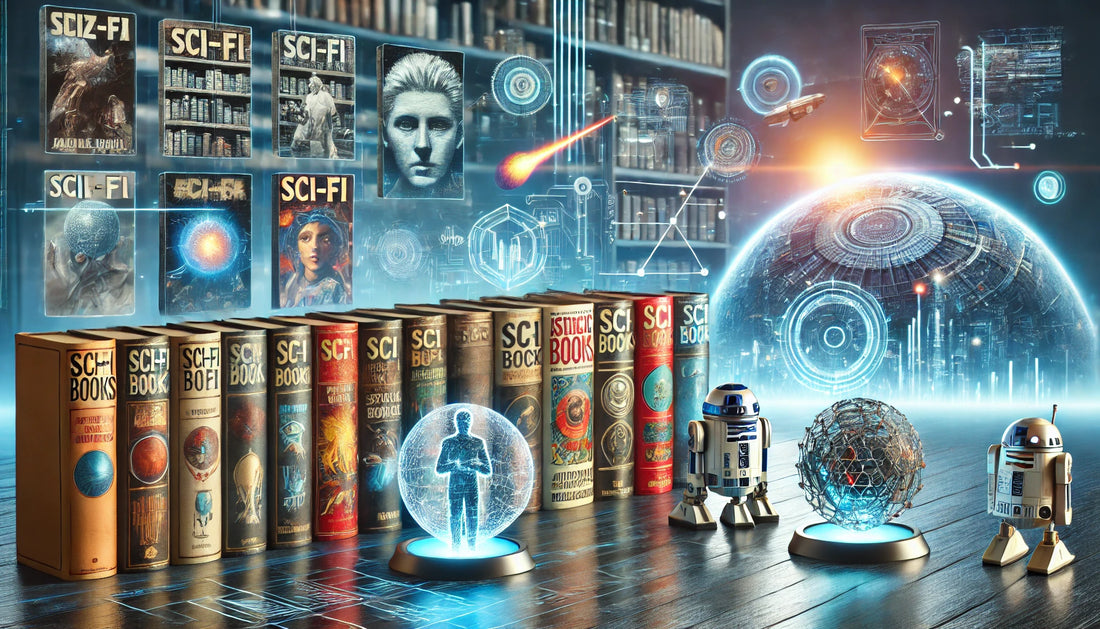
Sci-Fi Books That Predicted the Future
Share
Sci-Fi Books That Predicted the Future
Introduction
Science fiction has long been a genre that not only entertains but also inspires and predicts future technologies and societal changes. Many visionary sci-fi authors have accurately anticipated advancements and trends that shape our world today. This blog post explores some of the most notable sci-fi books that predicted the future, providing insight into the foresight of these incredible writers.
1. "1984" by George Orwell
Predictions: Surveillance and Government Control
George Orwell's "1984" is a dystopian novel that predicted the rise of pervasive surveillance and government control. Concepts like Big Brother, thought police, and constant monitoring resonate in today's world, where privacy concerns and government surveillance are hot topics. Orwell's depiction of a totalitarian regime offers a chilling look at the potential future of unchecked political power.
2. "Brave New World" by Aldous Huxley
Predictions: Genetic Engineering and Societal Control
Aldous Huxley's "Brave New World" foresaw a future where genetic engineering and psychological manipulation are used to maintain societal order. The novel's themes of bioengineering, the use of drugs to control behavior, and the commodification of human life echo today's advancements in genetic technology and debates over ethical boundaries.
3. "Fahrenheit 451" by Ray Bradbury
Predictions: Censorship and the Decline of Print Media
Ray Bradbury's "Fahrenheit 451" explores a future where books are banned and burned to suppress dissenting ideas. The novel predicted the decline of print media and the rise of alternative forms of entertainment that prioritize superficial content over critical thought. In an era of digital media and information overload, Bradbury's warnings about censorship and intellectual freedom remain relevant.
4. "Neuromancer" by William Gibson
Predictions: Cyberspace and Virtual Reality
William Gibson's "Neuromancer" is a seminal work that introduced the concept of cyberspace and predicted the rise of virtual reality and the internet. The novel's depiction of a connected digital world and the blending of human consciousness with technology laid the groundwork for understanding the implications of our increasingly digital lives.
5. "The Moon is a Harsh Mistress" by Robert A. Heinlein
Predictions: Artificial Intelligence and Political Revolution
Robert A. Heinlein's "The Moon is a Harsh Mistress" explores themes of artificial intelligence and political revolution. The novel's portrayal of a sentient AI, named Mike, and its role in a lunar colony's fight for independence highlights the potential and ethical considerations of AI in society. Heinlein's work foreshadowed the growing influence of AI in contemporary politics and technology.
6. "Snow Crash" by Neal Stephenson
Predictions: Virtual Reality and Digital Economies
Neal Stephenson's "Snow Crash" is a cyberpunk novel that predicted the rise of virtual reality, digital economies, and the concept of avatars. The Metaverse, a virtual reality space within the novel, is strikingly similar to modern virtual worlds and online communities. Stephenson's vision of a connected digital society is becoming increasingly real as VR technology advances.
7. "Do Androids Dream of Electric Sheep?" by Philip K. Dick
Predictions: Artificial Intelligence and Ethical Dilemmas
Philip K. Dick's "Do Androids Dream of Electric Sheep?" explores the ethical implications of creating artificial life forms. The novel, which inspired the film "Blade Runner," delves into the nature of consciousness and what it means to be human. As AI technology progresses, Dick's questions about the morality of creating and exploiting sentient beings are more relevant than ever.
8. "The Stand" by Stephen King
Predictions: Pandemics and Societal Collapse
Stephen King's "The Stand" is a post-apocalyptic novel that envisions a world ravaged by a deadly pandemic. The book's portrayal of societal collapse and the struggle for survival in the aftermath of a global health crisis mirrors real-world concerns, especially in light of recent events like the COVID-19 pandemic. King's depiction of human resilience and the fight for a new order remains poignant.
9. "The Foundation Series" by Isaac Asimov
Predictions: Predictive Analytics and Psychohistory
Isaac Asimov's "Foundation Series" introduces the concept of psychohistory, a mathematical approach to predicting the future behavior of large populations. This idea is akin to modern predictive analytics and data science, where large datasets are used to forecast trends and outcomes. Asimov's vision of using data to shape societal strategies is increasingly relevant in today's data-driven world.
10. "The Space Merchants" by Frederik Pohl and C.M. Kornbluth
Predictions: Consumerism and Corporate Control
"The Space Merchants" by Frederik Pohl and C.M. Kornbluth predicts a future dominated by consumerism and corporate control. The novel's exploration of advertising, corporate power, and environmental degradation offers a satirical yet insightful look at the potential consequences of unchecked capitalism. In an era where consumer culture and corporate influence are pervasive, the novel's themes are strikingly prescient.
Conclusion
Science fiction has a remarkable ability to anticipate future developments and provoke thought about the direction of our society. These sci-fi books not only entertain but also challenge readers to consider the implications of technological and societal changes. As we continue to advance, the visionary ideas presented in these works remind us of the potential futures that lie ahead.
